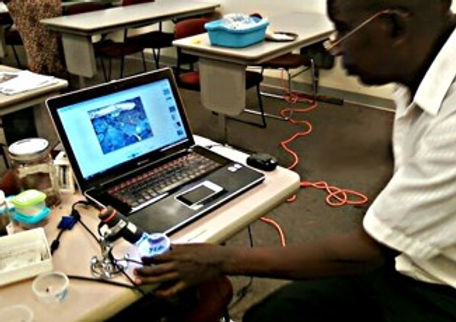top of page

Earth Reporters
Not everyone can visit the rainforests--but everyone can visit their backyard.
Earth Reporters is an online collaborative of scientists and ecologists working in biodiverse regions of the world. Our partners share our mission of connecting learners wherever they are with their local biodiversity. Online certificate programs using the Canvas LMS platform engage learners to be community educators, citizen scientists, and ambassadors of our planet. Virtual experiences are supplemented with local community-based experiences and opportunities to apply concepts learned. Learners who obtain a certificate become an official Earth Reporter in their community. Aimed for ages 9-100!
Who is an Earth Reporter? You!
-
Earth Reporters are investigators of science.
Earth Reporters think beyond the biology class textbook and are active researchers, environmental guardians, and data collectors in their local communities. Earth Reporters share their results in our Earth Teach publication and iNaturalist project database promoting awareness of current impacts and threats on local and global biodiversity.
-
Earth Reporters are scientific communicators.
Earth Reporters visit classrooms or participate in eco-literacy events or Earth Teach Book fairs. They may produce a podcast, interview local scientists as an Earth Teach journalist, or teach ecology and English to English language learners.
-
Earth Reporters promote educational equity and cultural exchange.
Earth Reporters may be involved in developing educational resources for global classrooms or provide services such as closed captioning that will make science videos accessible to new readers or ESL learners. Biodiversity resources and materials that are bilingual or multilingual are needed in reaching global classrooms with limited resources.

Teach to learn.

Learn about our changing planet.
Be an investigative researcher.
.png)


Be a citizen scientist.
Prior pilot programs integrated citizen science in ESL classrooms combining science with language acquisition.
Student Reviews:
"For me it was very interesting to combine science with learning English. For me it helped me to learn language as it applied to science . . . for me it helped to learn about the problems that is happening now with many species with extinction. It is an original and different way of learning. “
Make a global impact.

"Science was like being a detective or investigator. The more I learned the more I wanted to find out.
I remember looking at an insect under a microscope for the first time. . . looking at their face and features.
Would like to spend more time observing
insects under a microscope. . ."
 |  |  |
|---|---|---|
 |  |  |
 |  |  |
 |  |  |
 |  |  |
 |  |  |

With just English I wouldn’t know or learn about the animals. Now I know how many years and how long ago lived the animals. English and science should be together. . .that would be good.”
-52 year old African refugee from Tanzania

Guatemala partner FLAAR (Foundation for Latin American and Anthropological Research) using co-developed educational resources to teach Guatemala children about native bees.

For more information contact Anne Basham at info@earth-teach.org
bottom of page